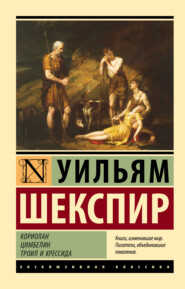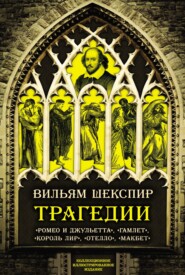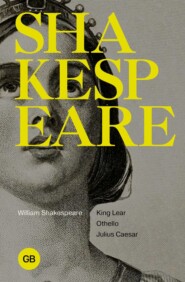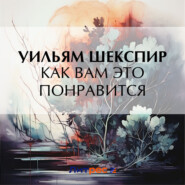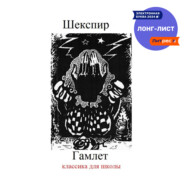По всем вопросам обращайтесь на: info@litportal.ru
(©) 2003-2025.
✖
Love's Labour's Lost
Настройки чтения
Размер шрифта
Высота строк
Поля
the vulgar, – O base and obscure vulgar! – videlicet, He came,
saw,
and overcame. He came, one; saw, two; overcame, three. Who
came? -
the king. Why did he come? – to see. Why did he see? – to
overcome.
To whom came he? – to the beggar. What saw he? – the beggar.
Who
overcame he? – the beggar. The conclusion is victory; on whose
side? – the king's. The captive is enrich'd; on whose side? -
the
beggar's. The catastrophe is a nuptial; on whose side? – the
king's. No, on both in one, or one in both. I am the king,
for so
stands the comparison; thou the beggar, for so witnesseth thy
lowliness. Shall I command thy love? I may. Shall I enforce
thy
love? I could. Shall I entreat thy love? I will. What shalt
thou
exchange for rags? – robes, for tittles? – titles, for thyself?
-me. Thus expecting thy reply, I profane my lips on thy foot,
my
eyes on thy picture, and my heart on thy every part.
Thine in the dearest design of industry,
DON ADRIANO DE ARMADO.
'Thus dost thou hear the Nemean lion roar
'Gainst thee, thou lamb, that standest as his prey;
Submissive fall his princely feet before,
And he from forage will incline to play.
But if thou strive, poor soul, what are thou then?
Food for his rage, repasture for his den.'
PRINCESS OF FRANCE. What plume of feathers is he that indited
this
letter?
What vane? What weathercock? Did you ever hear better?
BOYET. I am much deceived but I remember the style.
PRINCESS OF FRANCE. Else your memory is bad, going o'er it
erewhile.
BOYET. This Armado is a Spaniard, that keeps here in court;
A phantasime, a Monarcho, and one that makes sport
To the Prince and his book-mates.
PRINCESS OF FRANCE. Thou fellow, a word.
Who gave thee this letter?
COSTARD. I told you: my lord.
PRINCESS OF FRANCE. To whom shouldst thou give it?
COSTARD. From my lord to my lady.
PRINCESS OF FRANCE. From which lord to which lady?
COSTARD. From my Lord Berowne, a good master of mine,
To a lady of France that he call'd Rosaline.
PRINCESS OF FRANCE. Thou hast mistaken his letter. Come, lords,
away.
[To ROSALINE] Here, sweet, put up this; 'twill be thine
another
day. Exeunt PRINCESS and TRAIN
BOYET. Who is the shooter? who is the shooter?
ROSALINE. Shall I teach you to know?
BOYET. Ay, my continent of beauty.
ROSALINE. Why, she that bears the bow.
Finely put off!
BOYET. My lady goes to kill horns; but, if thou marry,
Hang me by the neck, if horns that year miscarry.
Finely put on!
ROSALINE. Well then, I am the shooter.
BOYET. And who is your deer?
ROSALINE. If we choose by the horns, yourself come not near.
Finely put on indeed!
MARIA. You Still wrangle with her, Boyet, and she strikes at
the
brow.
BOYET. But she herself is hit lower. Have I hit her now?
ROSALINE. Shall I come upon thee with an old saying, that was a
man
when King Pepin of France was a little boy, as touching the
hit
it?
BOYET. So I may answer thee with one as old, that was a woman
when
Queen Guinever of Britain was a little wench, as touching the
hit
it.
ROSALINE. [Singing]
Thou canst not hit it, hit it, hit it,
Thou canst not hit it, my good man.
BOYET. An I cannot, cannot, cannot,
An I cannot, another can.
Exeunt ROSALINE and KATHARINE
COSTARD. By my troth, most pleasant! How both did fit it!
MARIA. A mark marvellous well shot; for they both did hit it.
BOYET. A mark! O, mark but that mark! A mark, says my lady!
Let the mark have a prick in't, to mete at, if it may be.
MARIA. Wide o' the bow-hand! I' faith, your hand is out.
COSTARD. Indeed, 'a must shoot nearer, or he'll ne'er hit the
clout.
BOYET. An if my hand be out, then belike your hand is in.
COSTARD. Then will she get the upshoot by cleaving the pin.
MARIA. Come, come, you talk greasily; your lips grow foul.
COSTARD. She's too hard for you at pricks, sir; challenge her
to
bowl.
saw,
and overcame. He came, one; saw, two; overcame, three. Who
came? -
the king. Why did he come? – to see. Why did he see? – to
overcome.
To whom came he? – to the beggar. What saw he? – the beggar.
Who
overcame he? – the beggar. The conclusion is victory; on whose
side? – the king's. The captive is enrich'd; on whose side? -
the
beggar's. The catastrophe is a nuptial; on whose side? – the
king's. No, on both in one, or one in both. I am the king,
for so
stands the comparison; thou the beggar, for so witnesseth thy
lowliness. Shall I command thy love? I may. Shall I enforce
thy
love? I could. Shall I entreat thy love? I will. What shalt
thou
exchange for rags? – robes, for tittles? – titles, for thyself?
-me. Thus expecting thy reply, I profane my lips on thy foot,
my
eyes on thy picture, and my heart on thy every part.
Thine in the dearest design of industry,
DON ADRIANO DE ARMADO.
'Thus dost thou hear the Nemean lion roar
'Gainst thee, thou lamb, that standest as his prey;
Submissive fall his princely feet before,
And he from forage will incline to play.
But if thou strive, poor soul, what are thou then?
Food for his rage, repasture for his den.'
PRINCESS OF FRANCE. What plume of feathers is he that indited
this
letter?
What vane? What weathercock? Did you ever hear better?
BOYET. I am much deceived but I remember the style.
PRINCESS OF FRANCE. Else your memory is bad, going o'er it
erewhile.
BOYET. This Armado is a Spaniard, that keeps here in court;
A phantasime, a Monarcho, and one that makes sport
To the Prince and his book-mates.
PRINCESS OF FRANCE. Thou fellow, a word.
Who gave thee this letter?
COSTARD. I told you: my lord.
PRINCESS OF FRANCE. To whom shouldst thou give it?
COSTARD. From my lord to my lady.
PRINCESS OF FRANCE. From which lord to which lady?
COSTARD. From my Lord Berowne, a good master of mine,
To a lady of France that he call'd Rosaline.
PRINCESS OF FRANCE. Thou hast mistaken his letter. Come, lords,
away.
[To ROSALINE] Here, sweet, put up this; 'twill be thine
another
day. Exeunt PRINCESS and TRAIN
BOYET. Who is the shooter? who is the shooter?
ROSALINE. Shall I teach you to know?
BOYET. Ay, my continent of beauty.
ROSALINE. Why, she that bears the bow.
Finely put off!
BOYET. My lady goes to kill horns; but, if thou marry,
Hang me by the neck, if horns that year miscarry.
Finely put on!
ROSALINE. Well then, I am the shooter.
BOYET. And who is your deer?
ROSALINE. If we choose by the horns, yourself come not near.
Finely put on indeed!
MARIA. You Still wrangle with her, Boyet, and she strikes at
the
brow.
BOYET. But she herself is hit lower. Have I hit her now?
ROSALINE. Shall I come upon thee with an old saying, that was a
man
when King Pepin of France was a little boy, as touching the
hit
it?
BOYET. So I may answer thee with one as old, that was a woman
when
Queen Guinever of Britain was a little wench, as touching the
hit
it.
ROSALINE. [Singing]
Thou canst not hit it, hit it, hit it,
Thou canst not hit it, my good man.
BOYET. An I cannot, cannot, cannot,
An I cannot, another can.
Exeunt ROSALINE and KATHARINE
COSTARD. By my troth, most pleasant! How both did fit it!
MARIA. A mark marvellous well shot; for they both did hit it.
BOYET. A mark! O, mark but that mark! A mark, says my lady!
Let the mark have a prick in't, to mete at, if it may be.
MARIA. Wide o' the bow-hand! I' faith, your hand is out.
COSTARD. Indeed, 'a must shoot nearer, or he'll ne'er hit the
clout.
BOYET. An if my hand be out, then belike your hand is in.
COSTARD. Then will she get the upshoot by cleaving the pin.
MARIA. Come, come, you talk greasily; your lips grow foul.
COSTARD. She's too hard for you at pricks, sir; challenge her
to
bowl.






